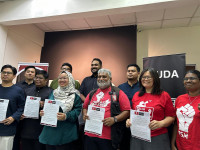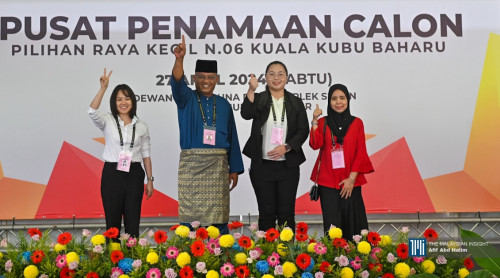PUTRAJAYA – The high court judge erred when he ruled that the use of Mandarin and Tamil as the medium of instruction in vernacular schools was valid and constitutional, the Court of Appeal heard today.
Lawyer Muhammad Haniff Khatri Abdullah told the Court of Appeal’s three-member bench that judge Datuk Mohd Nazlan Mohd Ghazali was also wrong when he decided that Article 152(1)(a)(b) of the federal constitution protected the use of Chinese and Tamil languages in vernacular schools.
He said vernacular schools are considered a public authority, and those schools must use Bahasa Malaysia as the medium of instruction, as provided under Article 152(1) of the federal constitution which states that Bahasa Malaysia is the national language.
Haniff said Nazlan also erred in law and facts when he held that vernacular schools were not public authority.
“The national language is one of the primary and important ways to achieve unity among ethnic groups and the different school systems, and the use of different languages as mediums of instruction have long divided the ethnic groups in Malaysia,” he submitted before the three-member bench comprising justices Datuk Supang Lian, Datuk M. Gunalan, and Datuk Azizul Azmi Adnan.
Haniff, who is representing the Islamic Education Development Council (Mappim) and the Confederation of Malaysian Writers Association (Gapena), also said justice Nazlan denied his clients’ right to call witnesses to testify when he decided to dispose of the suits by way of points of law without calling witnesses under Order 14A of the Rules of Court 2012.
He also submitted that the decision to allow the Chinese and Tamil national-type schools to continue operating using Mandarin and Tamil as the medium of instruction contradicted the policy that was approved by the government.
Haniff was submitting in the appeals brought by Mappim, Gapena, Ikatan Muslimin Malaysia (Isma), and Ikatan Guru-Guru Muslim Malaysia (I-Guru).
The four organisations have filed suits seeking a declaration that Sections 2, 17, and 28 of the Education Act permitting the establishment of Chinese and Tamil national schools which conduct teaching and learning using Mandarin and Tamil as the main languages is inconsistent with Article 152(1) of the federal constitution.
On December 29, 2021, high court judge Nazlan (now Court of Appeal judge) dismissed the suits brought by the Federation of Peninsular Malay Students (GPMS), Mappim, Gapena, and Isma. GPMS did not file the appeal to the Court of Appeal.
He ruled that the existence and establishment of vernacular schools and the use of Mandarin and Tamil languages in those schools are constitutional.
On May 29, last year, the Kota Baru High Court judicial commissioner Abazafree Mohd Abbas (now high court judge) also ruled that the existence of vernacular schools is constitutional, and dismissed the suit filed by I-Guru.
In the suit filed in December 2019, GPMS, Mappim, Gapena, and Isma sued several parties including the government and 13 other defendants. Among them were Chinese educationist groups Dong Zong and Jiao Zong, Persatuan Thamizhar Malaysia, Persatuan Tamilar Thurunal (Perak), and four political parties – MIC, MCA, Gerakan, and Parti Bumiputera Perkasa Malaysia.
As for I-Guru, the organisation sued the education minister, the government of Malaysia, seeking a declaration that Section 28 and Section 17 of the Education Act 1996 are inconsistent with Article 152 of the federal constitution and that it is void and of no effect.
The Chinese Language Council, the Tamil Language Association, and the Confederation of Former Tamil School Pupils, MCA, and the United Chinese School Committees Association of Malaysia (Dong Zong) were allowed to become interveners in the suit filed by I-Guru.
Justice Supang fixed tomorrow for case management to set hearing dates to continue the hearing of the appeals. – Bernama, July 5, 2023















.jpg)












